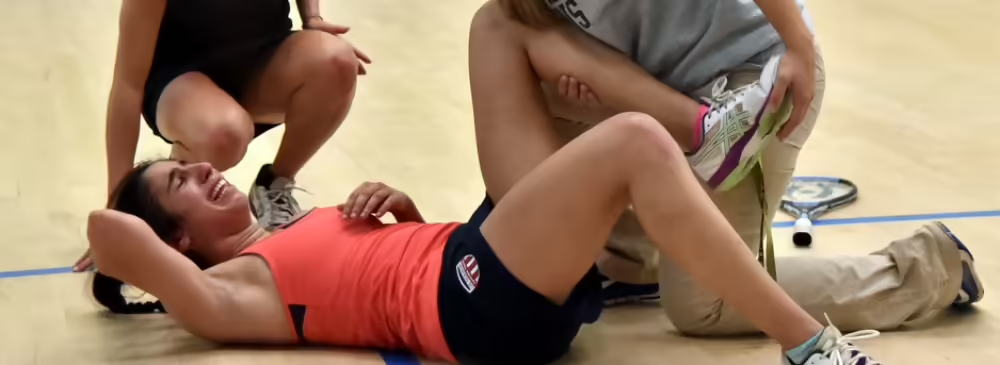10 November 2023 / 3-Min Read / Translate
If you have never been injured, you are either very young or very lucky. It really does happen to us all at some point in our lives. Some people recover really quickly, as if by magic, but most don't. Now, you might be thinking that because you are an amateur, "Injury Management" is overkill or simply not needed. Too often, I have heard phrases like "I'll just play through it" or "Once I get started, it will be fine". But you are wrong. Your approach to injuries, even as an amateur is crucial.
This article is not about HOW to actually treat different injuries - I'm not qualified to tell you that. It's about your attitude and approach when you do get one. Let me be clear: Always seek medical advice about injuries, and the sooner, the better.

Unexpected movements on a squash court can cause injuries like this twisted ankle.
There was a post on the Squash subreddit recently about a player twisting their ankle, but they COULD NOT miss their next match in a few days. The poster was looking for remedies to help speed up the process of recovery, and while I can't blame them for wanting to do that, the reality is that if the injury was serious enough, nothing could be done in a couple of days that would help.
The first problem was that the poster felt "he couldn't miss" the next match. This thinking is detrimental to effective injury management. There are very very few matches that require you to treat with painkillers or worse, completely ignore them. A British Open final or some other very prestigious event might count though. For amateurs, I don't believe ANY match is worth the risk of turning a slight injury into a longer-term or serious one.
So your first thought on the day of the injury, besides "How quickly can I see a professional about this injury?" Should be to seriously consider cancelling the next few day's matches and/or training sessions. I know that might seem a little drastic, but you need to approach this with the mindset of "I'll get back on court when the time is right, not just because I have a match scheduled!".

Obviously we are not all lucky enough to have physio available immediately after getting injury, but the least we can do is take the injury seriously.
So, the day of the injury, you stopped playing immediately, right? Then tried to see a professional or at least tried to book an appointment, right? So here you are, the day after. You wake up and tentatively test the injury. Ohhh, it feels better. Maybe even well enough to play.
And this is the moment that you could make it worse. Your desire to get back on court as quickly as possible is natural. A night's rest might be all that is needed, but the chances are it's not. Waking up and saying "I'll see how it feels" is opening the door to letting your heart overrule your head.
Your heart is telling you that getting on court is the best and fastest way to recover. Your head, depending on your age, should be telling you to take it easy for a few days. What's the worse that could happen with a few days extra rest? You miss a match or training session - that's not too bad.
What's the worse that could happen if you played too early? A more serious injury that takes you off court for weeks instead of days. Depending on the injury, unless you are at least 90% ready, you shouldn't go on court.
I understand how frustrating injuries are, especially when you are young or competitive. Not playing or training feels like a complete waste of time. But the balance between accepting that you are injured and behaving accordingly, and rushing back on court is a mindset issue. Even professionals, whose living depends on playing squash, know that getting back on court too early is bad for their long-term development.
Treat EVERY single injury as potentially serious. That way you will always ensure you long-term health comes first. Perhaps you will be lucky, and can play or train the next day, but that's rare.
Don't let your heart overrule your head. Ideally, get a qualified medical opinion and take their advice.